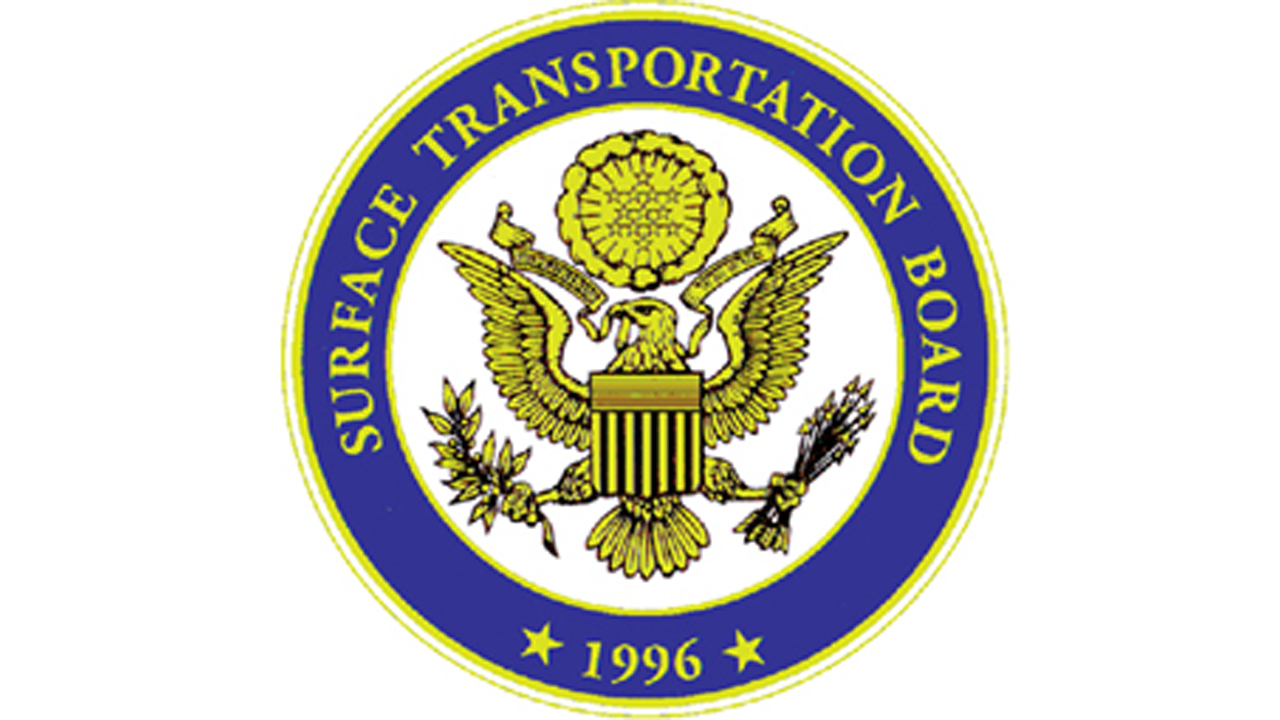
STB Denies Request to ‘Stay’ Requirement That Class I’s Commit to Arbitration Program (Updated)
Written by Marybeth Luczak, Executive Editor
CSX, Norfolk Southern (NS), Union Pacific (UP) and the U.S. operating subsidiaries of CN on Dec. 29, 2022 requested that the Surface Transportation Board (STB) stay its requirement that the Class I railroads commit to a new arbitration program for small rate disputes. STB on Jan. 23, 2023 denied the request.
The two rulings are Final Offer Rate Review (FORR) Docket No. EP 755, and Joint Petition for Rulemaking to Establish a Voluntary Arbitration Program for Small Rate Disputes, Docket No. EP 765.
STB described FORR, effective March 6, 2023, 60 days from date of publication in the Federal Register (Jan. 4, 2023), as “a voluntary arbitration program and an entirely new procedure for rate challenges.” The final rule establishing the Voluntary Arbitration Program is effective Feb. 3, 2023, 30 days from the date of publication in the Federal Register (Jan. 4, 2023).
“Either rate review mechanism will substantially improve shippers’ access to rate reasonableness reviews for smaller rate disputes,” STB said, adding that the Voluntary Arbitration Program will become operative “only if all seven Class I carriers commit to participating in the program for five years and do so within 50 days of the date of publication of the final rule in the Federal Register,” and that “if all Class I carriers do so, they will be exempt from the FORR procedure.”
Both review mechanisms are limited to rate disputes worth up to $4 million in relief over two years. Under the new FORR procedure, if STB finds a rate to be unreasonable, the Board “will decide the rate by selecting either the complainant’s or the defendant’s final offer, subject to an expedited procedural schedule that adheres to firm deadlines. Under the arbitration program, Class I rail carriers would commit for a period of five years to arbitrate rate disputes, under a similarly expedited schedule.”
In September 2019, STB issued a Notice of Proposed Rulemaking (NPRM) and sought public comment on its proposal for the new FORR procedure. “Subsequently, five Class I railroads [CN, CSX, Kansas City Southern, NS and UP] filed a joint petition urging the Board to exempt them from the FORR procedure, promising in return to agree to resolve rate challenges through binding arbitration, a methodology in which the carriers had previously refused to participate for many years,” the Board noted on Dec. 19, 2022. “The Board reviewed that petition and explored whether establishing a voluntary arbitration program would provide a practical alternative dispute resolution mechanism to address smaller rate disputes. In November 2021, following this effort, the Board advanced rulemakings in both FORR and the establishment of a Voluntary Arbitration Program.”
According to the Dec. 29, 2022 filing by CSX, NS, UP and the U.S. operating subsidiaries of CN (download below), “The Board has been right to recognize throughout this proceeding that it is fundamentally unfair to ask railroads to commit to a five-year arbitration program with limited withdrawal rights before they know what the final program will be. In the December 19 [2022] Decision, the Board created a new arbitration program for small rate disputes, and reaffirmed that it ‘will not require carriers to commit to participate in the arbitration program before knowing the content of the final rule being adopted.’ Indeed, in this proceeding the Board denied a motion that would require railroads to state their willingness to participate in arbitration program before rulemaking was concluded, in part because ‘the carrier’s ultimate decision could change depending on subsequent developments in the Arbitration docket and the FORR docket.’
“But the December 19 [2022] Decision has been structured in a way that contradicts these statements, by providing that Class I railroads must decide whether to sign up for five years in the program within a ‘limited window’—20 days after the effective date of the rule (referred to herein as the ‘Pre-Review Opt-in Requirement’). This signup deadline, which depending upon Federal Register publication will be sometime in mid-February 2023, could expire before the Board has decided any reconsideration petitions and will certainly expire before courts have decided any appeals of the December 19 [2022] Decision. This Pre-Review Opt-In Requirement is a new change to the final rule; the notice of proposed rulemaking proposed to allow a carrier to file its opt-in notice ‘at any time.’”
According to CSX, NS, UP and the U.S. operating subsidiaries of CN, “There is no justification for a Pre-Review Opt-In Requirement forcing railroads to commit to the arbitration program before knowing what its final content will be, including ultimate resolution of reconsideration petitions and appeals, and this aspect of the December 19 [2022] Decision should be stayed pending resolution of reconsideration petitions and appeals.”
While the all “the undersigned railroads support the basic goals and structure of the Arbitration Program,” they wrote that they “have concerns over certain aspects of the December 19 [2022] Decision. The undersigned railroads are considering filing judicial appeals or petitions for reconsideration, and other parties such as shipper associations may do so as well. Asking railroads to commit to the Arbitration Program before such petitions for reconsideration and appeals are ultimately decided—as the Pre-Review Opt-in Requirement does—would risk eviscerating railroads’ rights to seek agency reconsideration and judicial appeals of final STB decisions and contradict the Board’s holding that it would ‘not require carriers to commit to participate in the arbitration program before knowing the content of the final rule being adopted.’”
For these reasons, CSX, NS, UP and the U.S. operating subsidiaries of CN are asking STB to stay its “requirement that Class I railroads commit to the Arbitration Program within 20 days of its effective date (the Pre-Review Opt-in Requirement), and that the Board continue such a stay until the latter of final resolution of all petitions for reconsideration and judicial appeals of the December 19 Decision. Only then will railroads know the final contours of the arbitration program and have a fair opportunity to make decisions on whether to make a five-year commitment to that program.”
Wilner Weighs In
Railway Age Capitol Hill Contributing Editor Frank N. Wilner, a former STB chief of staff and earlier assistant vice president for policy at the Association of American Railroads, said the Board’s Democratic majority—Chairman Martin J. Oberman, Karen J. Hedlund and Robert M. Primus—has created a rare break in consensus that had been a feature of the Oberman chairmanship.
“The requirement for all Class I railroads to opt in within 50 days was not in the proposed rule,” Wilner told Railway Age in December 2022. “Republican Board member Patrick J. Fuchs observed in a separate expression that this addition to the final rule creates a situation where if just one Class I railroad declines to participate in the arbitration program, it will prevent its implementation for all willing participants. Moreover, Fuchs said that if FORR is overturned on judicial review, shippers ‘may end up with no additional avenue for relief.’ In his expression, Fuchs suggested two alternatives that would have prevented the petition for stay and that the Democratic majority could still adopt in revised rules.
“One, the STB could have held off on FORR and waited to see whether all Class I carriers opt into the arbitration program. Or, the majority could have included in the rule an annual opt-in period, providing carriers additional opportunities to opt-in after the conclusion of a likely judicial review of FORR.
“As for the petition for stay, it is connected to the real battle forthcoming in an appellate court—the legality of the rules themselves.”
CP Comments on Proposed ‘Stay’
Canadian Pacific (CP) on Jan. 2, 2023 filed comments with the STB regarding the stay sought by CSX, NS, UP and the U.S. operating subsidiaries of CN (download below). While CP wrote that it “takes no position on the merits of the stay,” it continues “to support the effort to find a workable, reasonable, and accessible Alternative Dispute Resolution (ADR) program for small rate cases, as CP stated in our January 25, 2021 letter to the Board in this docket, and CP believes that the Board’s December 19 [2022] decision and order in this docket was a constructive step in the direction of implementing such a program. Nonetheless, CP sees opportunities to improve the ADR rules put forward in the December 19 [2022] decision and order. If the Board wishes to improve the chance that all Class I’s would opt in to a set of ADR procedures, CP sees wisdom in the Board adopting a process to create opportunities for the ADR rules to be improved, ideally before carriers must decide whether to opt in to those rules.”
January 2023 Court Actions
STB on Jan. 4, 2023 provided notice of the following court actions:
- CSX Transportation, Inc. v. Surface Transportation Board and United States of America, instituted Dec. 29, 2022, in the United States Court of Appeals for the Eleventh Circuit, seeking judicial review of the Board’s Dec. 19, 2022 decision in Docket No. EP 765, Joint Petition for Rulemaking to Establish a Voluntary Arbitration Program for Small Rate Disputes.
- Grand Trunk Corporation and Illinois Central Railroad Company v. Surface Transportation Board and United States of America, instituted Dec. 29, 2022, in the United States Court of Appeals for the Seventh Circuit, seeking judicial review of the Board’s Dec. 19, 2022 decision in Docket No. EP 765, Joint Petition for Rulemaking to Establish a Voluntary Arbitration Program for Small Rate Disputes.
On Jan. 30, STB provided notice of a court action by the Association of American Railroads (AAR): AAR v. v. Surface Transportation Board and United States of America, instituted on Jan. 18, 2023, in the United States Court of Appeals for the District of Columbia Circuit, seeking judicial review of the Board’s
Dec. 19, 2022 decision in Docket No. EP 755, Final Offer Rate Review, Docket No. EP 665 (Sub-No. 2), Expanding Access to Rate Relief.
STB Denial of ‘Stay’ Request
In its Jan. 23, 2023 decision (download below), STB wrote that under 49 U.S.C. § 1321(b)(4), it “may issue an appropriate order, such as a stay, when necessary to prevent irreparable harm. In deciding a request for stay, the Board considers: (1) whether the party seeking a stay is likely to prevail on the merits, (2) whether the party seeking a stay will be irreparably harmed in the absence of a stay, (3) whether issuance of a stay would substantially harm other parties, and (4) whether issuance of a stay is in the public interest. … The party seeking a stay carries the burden of persuasion on all of the elements required for such extraordinary relief. … The threshold consideration in deciding whether a stay is appropriate is whether the moving party will be irreparably harmed without it. … As to irreparable harm, the party seeking a stay must show that the injury claimed is ‘imminent, certain[,] and great.’”
According to STB, CSX, NS, UP and the U.S. operating subsidiaries of CN state that “they intend to challenge—either through a petition for reconsideration or judicial appeal—the so-called ‘Pre- Review Opt-In Requirement’ directing Class I carriers to inform the Board whether they will participate in the arbitration no later than 20 days after the final rule becomes effective, as opposed to a later deadline occurring after appeals and petitions for reconsideration have been resolved. … They argue that imposing a commitment deadline that occurs before the resolution of any appeals or reconsideration petitions is arbitrary and capricious because it is inconsistent with the Board’s statement in Arbitration Final Rule that it ‘will not require carriers to commit to participate in the arbitration program before knowing the content of the final rule being adopted.’ … They further argue that a pre-review commitment deadline would circumvent their rights to seek reconsideration or appeal. … The four Class I carriers [CSX, NS, UP and the U.S. operating subsidiaries of CN] also state that they ‘may’ seek reconsideration of other aspects of the arbitration program, though they do not specify which ones. … Two of them have also initiated judicial review of Arbitration Final Rule but have yet to detail their arguments.”
STB reported that the four Class I carriers “have not shown that they are likely to prevail on the merits” for these reasons:
- “First, the Board cannot make the requisite finding that the four Class I carriers are likely to prevail on the merits because the four Class I carriers’ petition fails even to identify any merits-based argument for why the Board or a court would make a change to the program. Instead, the carriers’ petition presents a single argument as the basis for granting a stay of the pre-review opt-in deadline: that they are likely to prevail on the argument that Class I carriers should be allowed to wait to commit to the program until after any appeals or reconsideration petitions have been decided. But any judicial appeal or administrative petition for reconsideration based solely on the due date of the opt-in would be meaningless because there would be no reason to adjust the deadline if the arbitration program would not otherwise change. Although the petition vaguely alludes to the possibility that some party could file an appeal that raises additional issues, the petition before the Board fails to identify any such issues, much less show that those issues are likely meritorious as would be required for the Board to grant a stay. Because the four Class I carriers have not even argued that there is some additional aspect of the program that they are likely to succeed in challenging, there is simply no reason to conclude that the program is likely to change and, thus, no reason for the Board to stay the opt-in deadline in anticipation of such changes.
- “Second, despite their contrary assertions, the four Class I carriers do know the content of the rule to which the opt-in requirement would apply: should they decide to opt in, they would be committing to the rules set forth in Arbitration Final Rule as published in the Federal Register on January 4, 2023. Because any successful judicial appeal of the rule would presumptively result in vacatur … the prior commitment by a carrier to the vacated rule would no longer be operative. In any event, any material change to the rule (whether accomplished via appeal or reconsideration) would entitle the four Class I carriers to withdraw from the program under the terms of the program itself. … A challenge to the arbitration program that would be weighty enough to ground a successful appeal and dissuade the four Class I carriers from committing is very likely to be considered material. Regardless, the petition has identified no such challenge, or, indeed, any merits-based challenge at all. For this reason, there is nothing contradictory between the Board’s statement that it will not require the Class I carriers to decide whether to participate before knowing the content of the final rule and the so-called ‘Pre-Review Opt-In Requirement.’ The Board’s statement was made during the pendency of the rulemaking in response to the concern articulated by railroad commenters that they would be required to state whether they would choose to participate in the arbitration program while that program was still subject to notice-and-comment. But the rulemaking is complete and, as explained here, no basis has even been suggested to find that the program is likely to be modified due to an appeal. Accordingly, the four Class I carriers and all other stakeholders know what the final rule is. The fact that the final rule is subject to the normal reconsideration and judicial review processes does not change this.
- “Finally, the four Class I carriers argue that requiring them to decide whether to commit to the arbitration program before appeals and reconsideration petitions have concluded deprives them of their ability to appeal or seek reconsideration. But the four Class I carriers articulate no reason why they would not be permitted to continue their appeals of the Arbitration Final Rule once they have opted into the arbitration program and the program has become effective.”
STB also found that the four Class I carriers “have not shown irreparable harm.” According to STB, they “have not articulated any reason why they would forgo their right to seek administrative or judicial appeals by choosing to participate in the arbitration program. In addition, the loss of the ‘time, energy, and resources’ devoted to developing the arbitration program does not constitute an irreparable harm. A party that takes part in a rulemaking proceeding runs the risk that the resources it expends may be wasted, from the party’s perspective, if the agency reaches an outcome the party does not support.” Additionally, the “remaining alleged harms identified by the four Class I carriers are not causally related to the pre-review commitment deadline that they seek to stay,” STB reported. “The identified harms are those that would allegedly accrue if the arbitration program failed to go into effect because not all Class I carriers opted into the program. But the decision whether to opt in is one that belongs to the carriers themselves and not the Board. The fact that the opt-in deadline occurs before the completion of any appeals or reconsideration processes should not reasonably be expected to affect the carriers’ initial opt-in decision to the program as it exists.”
The four Class I carriers have also “failed to establish that the balance of equities and public interest favor a stay,” according to STB. “They argue that, absent a stay, it is possible that not all Class I carriers will opt in and, as a result, the program will not become operable, thereby depriving shippers and the public of the arbitration program’s benefits. But again, even if cognizable, that alleged harm is not causally attributable to the timing of the opt-in requirement: even after this denial, carriers remain free to opt in and, for the reasons stated above, the lack of a stay should not reasonably be expected to change their calculus. If the Board were to grant the stay, however, the Board would be guaranteeing that the arbitration program’s benefits would not come to pass during the pendency of the appeals. A stay would therefore harm shippers and the public by depriving them of the arbitration program benefits that the stay petition champions. Because a stay would harm shippers and the public with no articulable benefit to the four Class I carriers, these factors also weigh against a stay.”
STB said its decision to deny the petition to stay is “without prejudice to parties to file a new petition for stay within 10 days of the filing of petitions for reconsideration.” While all five STB Members concurred, Members Patrick Fuchs and Michelle Schultz concurred with separate expressions.



